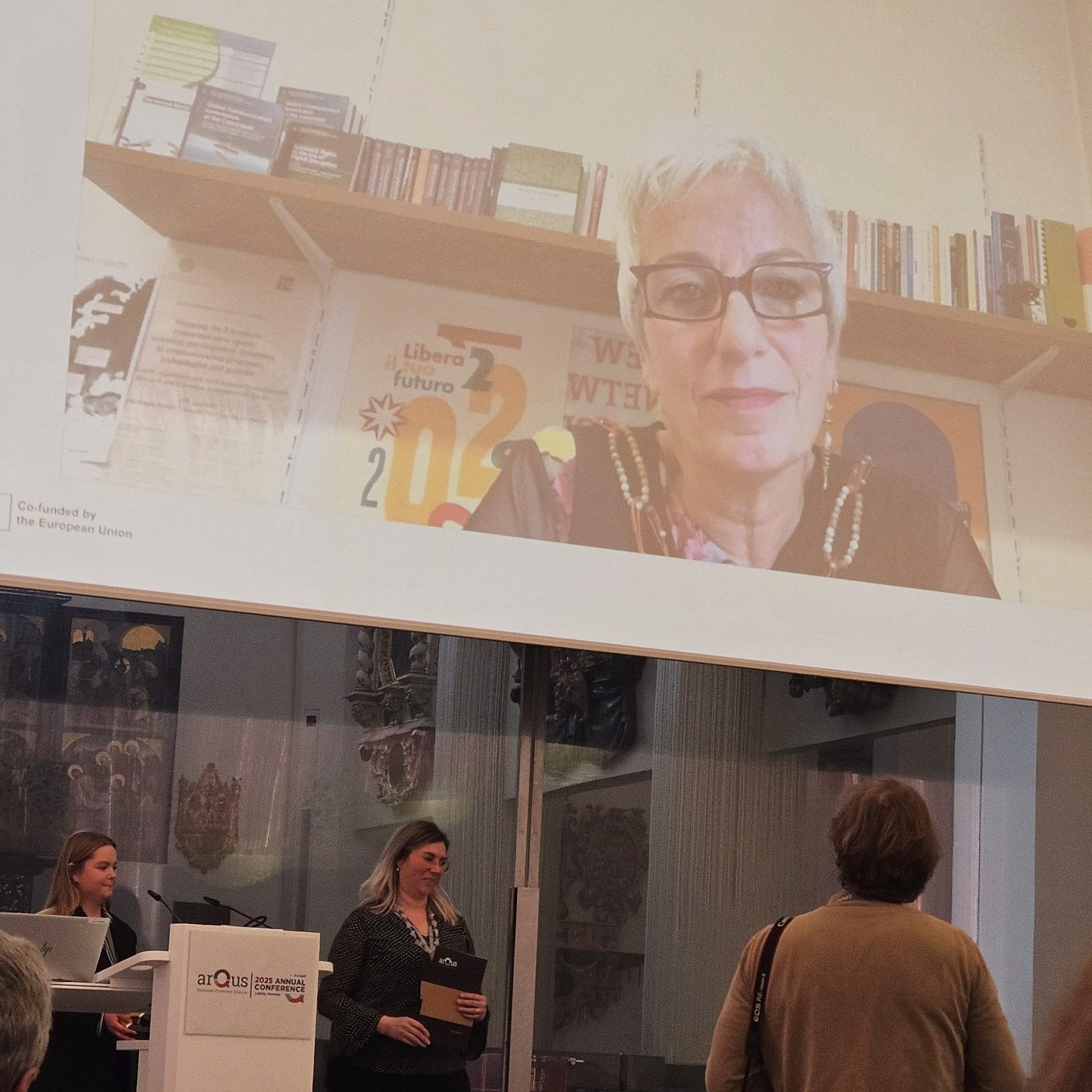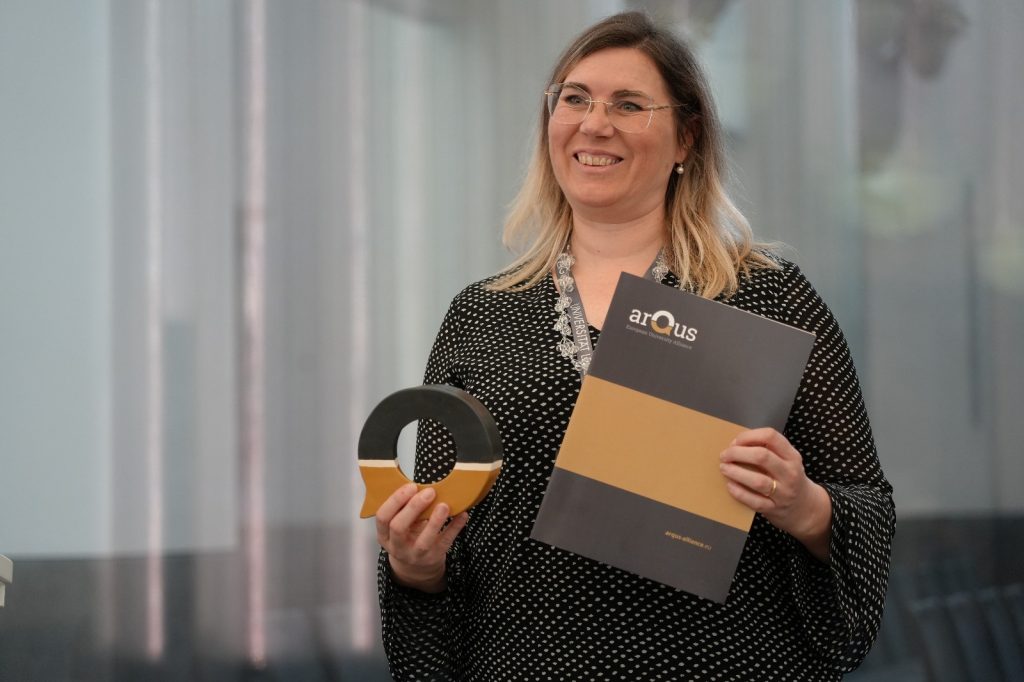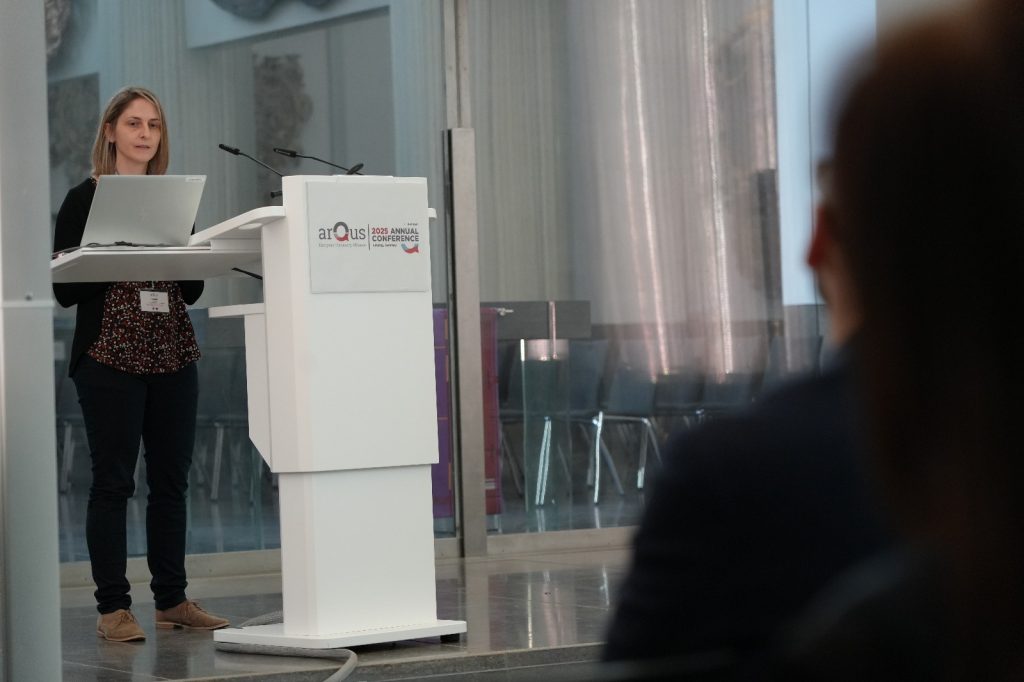Congratulations to the Arqus Teaching Excellence Award winners!
|
03 Apr 2025The winners of the 4th edition Arqus Teaching Excellence Award were awarded today 3 April during the 2025 Arqus Annual Conference in Leipzig.
The Arqus Teaching Excellence Award recognizes educators within the Alliance who demonstrate innovation and excellence in their teaching practices. This award celebrates initiatives that foster inclusive, student-centred learning environments, promote research-informed teaching approaches, and empower students from diverse backgrounds to thrive in dynamic educational settings.
This year, the honorees are Silvia Kober (University of Graz) and Claudia Padovani (University of Padua).
The course “Applied neuropsychology in human-computer interaction” is for Master’s students in the two study fields of Psychology at the University of Graz and Computational Social Systems (CSS), which is a master’s degree program offered jointly by the University of Graz and the Graz University of Technology. This course is highly interdisciplinary module and it addresses the rapidly evolving field of human-computer interaction.
The aim of this course is to expand the theoretical and practical knowledge about human-computer interaction systems on a multidimensional level and to enhance the students’ critical thinking in this context, enabling responsible use of this technology and contributing to its further development in the future. Learning outcomes focus on fostering communication, collaboration, creativity, and critical thinking.
The course delves into the field of human-computer interaction, placing particular emphasis on brain-computer interaction (BCI), its applications in assisting individuals with disabilities, and the ethical considerations surrounding neurotechnology. By combining theoretical knowledge with hands-on experience, students engage critically with both the benefits and potential risks of these technologies, including emerging issues like neurorights.
Innovative teaching methods in this course include project-based learning, where students actively develop their own BCI systems. For example, in one project, students use their BCI system to control a virtual reality environment, such as directing an avatar to collect virtual diamonds based on brain activity. These hands-on projects not only make learning enjoyable but also prepare students with practical skills for careers in emerging fields like clinical psychology, where technologies like virtual reality are increasingly relevant.
The course also incorporates mobile technology and gamified learning experiences. Students are encouraged to explore AI tools, such as ChatGPT, to learn about neuroscientific methods, compare AI-generated content to textbooks, and critically evaluate the strengths and limitations of AI in academic contexts. Additionally, the course includes a gamified “Escape the Lab” activity that transforms lab demonstrations into an immersive escape room challenge. In groups, students solve neuroscience-related puzzles using tools like EEG and virtual reality to progress through the game. This approach fosters engagement, reinforces course content, and deepens practical understanding of neuroscientific techniques.
The course “Communication practices diversity and inclusion” has been offered at the University of Padua since 2020, as a compulsory course in the English curricula of the Communication Strategy degree. The course offers opportunities to explore the intersection of media, communication, and democratic principles such as access, inclusion, participation, pluralism, and equality.
Students gain awareness of current debates concerning global communications – including news media, traditional and digital, ICT and digital platforms – and their social implications in relation to the needs and capacities of different social groups, including women and LGBTQI+ communities, ethnic minorities and indigenous peoples. Through interactive learning, group projects, and international collaborations, students develop transversal skills, including public speaking, intercultural communication, and critical analysis.
A key component of the course was its involvement in the EU-funded project “Rewriting the Story: Tackling Media Gender Stereotypes in Political and Public Life”, coordinated by the International Federation of Journalists. Over the 2022-2024 academic years, students contributed to the project by conducting research, developing media monitoring tools, and creating publicly accessible educational resources.
Their work included fact sheets on women’s political participation across 12 European countries, analysis of gender representation in news media, and the production of multilingual reviews, interactive maps, podcasts, videos, and educational games. By engaging with international scholars, media professionals, and policymakers, students developed a deep understanding of the role of gender-sensitive journalism in fostering democracy and freedom of expression.




By acknowledging and supporting outstanding pedagogical practices, the Arqus Teaching Excellence Award aims to inspire educators across the alliance to continue enhancing the quality of teaching and learning, ultimately benefiting the diverse student communities they serve. Each winner receives a €5000 prize, dedicated to furthering the development of teaching and competence.
Teachers from Arqus Universities, who are interested in collaboration and innovation in their teaching, are welcome to apply for the newly established Teaching Innovation Fund.
Have a look at the video of the Teaching Excellence Award Ceremony that took place during the Arqus Annual Conference and the presentation of the winning projects by the awarded academics from the universities of Graz and Padua.